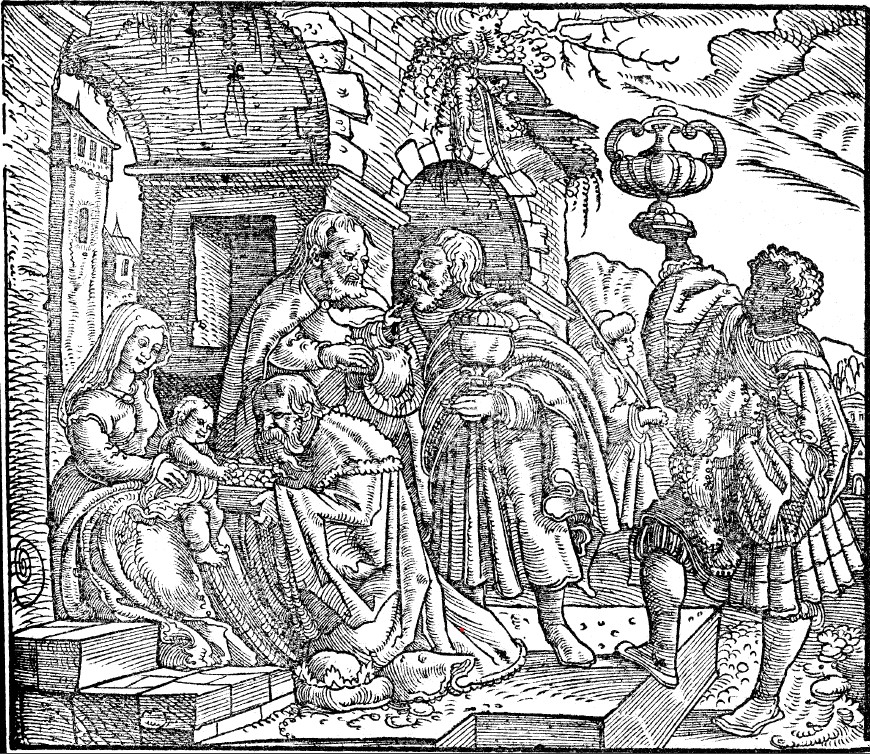
Lessons: Isaiah 60:1-6, Ephesians 3:1-12, Matthew 2:1-12
Hymns: LSB 377, 395, 399 and many hymn requests for our hymn sing
Grace, mercy, and peace to you from God our Father and our Lord and Savior, Jesus Christ. Amen.
Following the twelve days of Christmas, the Church observes another Christmas—the great day of the Epiphany of our Lord. Epiphany always falls on January 6, and it is a day of great joy that the Church should never forget. As the Church Year developed in the Early Church, Christians began celebrating Epiphany on this day as a combined Christmas and Epiphany long before Christmas became its own fixed day in the Church Year calendar.
The importance of this day is still seen in some places across the globe. Several European countries observe this day as a national holiday. In Spain and some Latin American countries, few gifts are given at Christmas; instead, the tradition of giving gifts is something that is done on Epiphany—reflecting the Magi who gave gifts to Jesus when they came to worship Him.
Not only has this become a forgotten feast of the Church in America, but events three years ago at our nation’s capitol have become an annual observance of sorts on January 6, seemingly to keep the anger going against the opposing parties. How pitiable we have become when we allow this Christian holiday to be overshadowed by politics.
The word Epiphany (ἐπιφάνεια) occurs seven times in the Greek. In each of these occurrences, the word is translated as “appearance.” The word is first found in one of Paul’s earlier writings—2 Thessalonians 2:8—which declares what Jesus will do to the Antichrist when Jesus returns for Judgment, writing, “And then the lawless one will be revealed, whom the Lord Jesus will kill with the breath of His mouth and bring to nothing by the appearance [ἐπιφάνεια] of His coming.” The remaining occurrences of this word are in St. Paul’s last writings in his Pastoral Epistles to Timothy and Titus. Often, this word also refers to the appearing of our Savior on the Last Day, but the word sometimes refers to our Lord’s first coming. It is written in 2 Timothy 1:8-10, “Therefore do not be ashamed of the testimony about our Lord, nor of me his prisoner, but share in suffering for the gospel by the power of God, who saved us and called us to a holy calling, not because of our works but because of his own purpose and grace, which he gave us in Christ Jesus before the ages began, and which now has been manifested through the appearing [ἐπιφάνεια] of our Savior Christ Jesus, who abolished death and brought life and immortality to light through the gospel.”
The Church has chosen to use the word “Epiphany” to see how the Christ Child reveals Himself as God, for the word not only means “appearing” but also means “manifestation.” Jesus is God in the flesh made manifest. Jesus is revealed as God when the Magi come from the East to worship the Christ Child at the house where He was staying. It is evident that He is not an ordinary Child when the star arises to indicate His birth. The Magi travel to offer Him gifts of gold, frankincense, and myrrh.
The tradition of gift giving came from the Magi. As Christians, it is important for us to understand the difference between gift and response or work. You see, we stand before God acquitted of our sin not from our response to the Gospel or from the works we do, whether those works involve loving God or our neighbor, giving gifts to those whom we love or those who need them, or acts of Christian service. Instead, we stand before God acquitted because we are recipients of God’s gifts. In love, our Father in Heaven sent His only begotten Son into the world to pay for our sins. In love, Jesus went to the cross bearing our sin in His Body and offering His Blood as the ransom payment for our sin. In love, Jesus died and rose from the grave for our justification. In love, He sends His Holy Spirit to guide us into the way of truth. In love, we are baptized into Christ and adopted into God’s holy family. In love, He receives us into His eternal kingdom. In love, He will raise our bodies from the dead on the Last Day and give us perfect bodies that will dwell in His presence forever.
These are the gifts we receive by God’s grace without any merit or worthiness in us. Having received forgiveness of sins and eternal salvation as free gifts, we respond with good works—like giving to the Lord, singing our praises, serving God, doing good to our neighbors, and, yes, giving gifts. Some of the greatest acts of love you can do for others is to tell them about Jesus, inviting them to Church, and forgiving them in Christ. We give these gifts to them because of the gifts we have already received through Christ. Jesus, God’s own Son, has come to take away our sin and give us life. We are reconciled to God! What blessed gifts to receive—and give! Amen.
The peace of God which passes all understanding keep your hearts and minds in Christ Jesus to life everlasting. Amen

